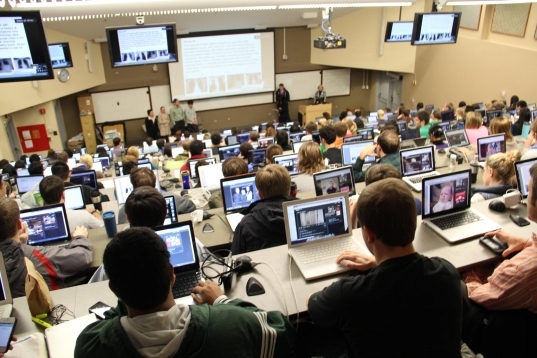Put Away the Laptop. Take Longhand Notes.

Medical students using laptops in class (click for credit)
In the fall of 2014, I taught a chemistry class at Anderson University. While I had been a guest lecturer for several university-level courses over the years, it was the first time in 19 years that I had taught an entire, semester-long class. As a result, I experienced some things I had never experienced before, and one of them was students using laptops to take notes. It wasn’t incredibly common in my class, but every day, a few students would come in, sit down, and open up their laptops.
I wasn’t crazy about the students using laptops in my class, mostly because I think they can be distracting for the students using them. If a student sees an e-mail message or Facebook notification, it is easy for the student to flip over to those things rather than concentrate on what is happening in class. However, I strongly believe that at some point, you need to start treating students as adults. Thus, I didn’t tell them that they couldn’t use laptops. I did note who the laptop users were and, when I processed test scores, I would compare the average of the students using laptops to the average of the rest of the class. Each test, the laptop users had a lower test score average.
Of course, my sample size was very small. As a result, the statistical error kept me from making any firm conclusion regarding laptop use in class and performance on the tests, but the results did correlate with my “gut feeling” regarding laptop usage, so I became even more convinced that laptop usage in class harms a student’s performance. Little did I know that there is actually a large body of statistically-significant research on the subject, and the studies are in general agreement: taking notes with your laptop is simply not as effective as taking notes longhand.
I learned this by reading a very interesting study that was published in the journal Psychological Science. As is typical with such reports, the paper starts off with a review of the literature. It cites three studies that show laptop-note-takers have decreased academic performance compared to longhand-note-takers, and one study that shows that the students themselves are less satisfied with their education when they use laptops to take notes. Of course, the “obvious” explanation for this is that the students who use laptops in class are being distracted by the other things available on their computers. However, the study linked above shows that even when distractions are removed from the computer, students still get less out of class when they use a laptop to take notes.
The researchers studied three different groups of university students in three different trials. Each trial involved the students viewing a lecture on a monitor. They were instructed to use the note-taking strategy that they used in class, and they were told that they would be tested on the content of the lectures. Students who used a laptop were given one that had no games and no access to the internet. In the first trial, students who took notes on the computer and students who took notes on paper scored roughly the same on the factual questions asked about the lecture, but the students who took notes on paper scored significantly better on the conceptual questions.
One thing the researchers found when analyzing the data from the first trial was that the students who took notes with their laptops used more words in their notes and were much more likely to quote parts of the lecture verbatim. Thus, in their second trial, they instructed some of the students to specifically avoid trying to transcribe the lecture. They thought that this might reduce the problems associated with laptop-note-taking. However, there was only a small decrease in the verbatim content of the laptop users who were told to avoid it, and in the end, the same test results were found: the laptop-note-takers did worse on conceptual questions than the longhand-note-takers.
In the final trial, the researchers thought that perhaps the poorer performance of the laptop-note-takers could be improved by letting them study their notes. After all, if the notes contain more words and more verbatim content from the lecture, that should allow the students who use laptops to study more effectively. In this trial, however, the longhand-note-takers did even better compared to the laptop-note-takers! Those who were able to study their longhand notes outperformed those who studied their laptop notes in both factual and conceptual questions!
Here is how the authors sum up their results:
The studies we report here show that laptop use can negatively affect performance on educational assessments, even — or perhaps especially — when the computer is used for its intended function of easier note taking. Although more notes are beneficial, at least to a point, if the notes are taken indiscriminately or by mindlessly transcribing content, as is more likely the case on a laptop than when notes are taken longhand, the benefit disappears.
I think that statement is instructive to students in two ways: First, stop using your laptop in class. It is likely to affect your performance negatively, even if you can avoid the distractions it presents. Second, even when you are taking notes longhand, don’t mindlessly transcribe content. Think about what you are learning and put it in your own words!
Jay L. Wile's Blog
- Jay L. Wile's profile
- 31 followers



